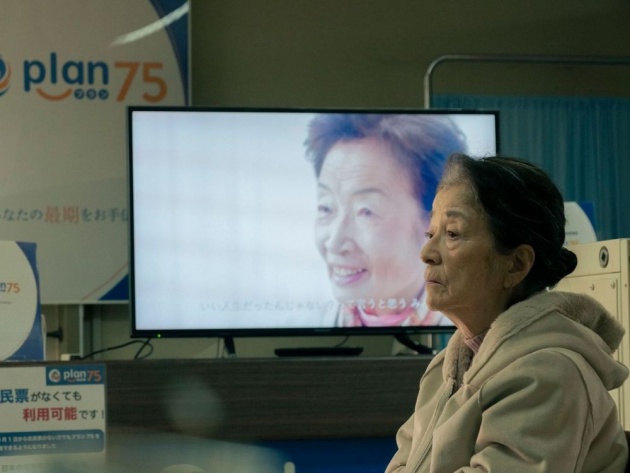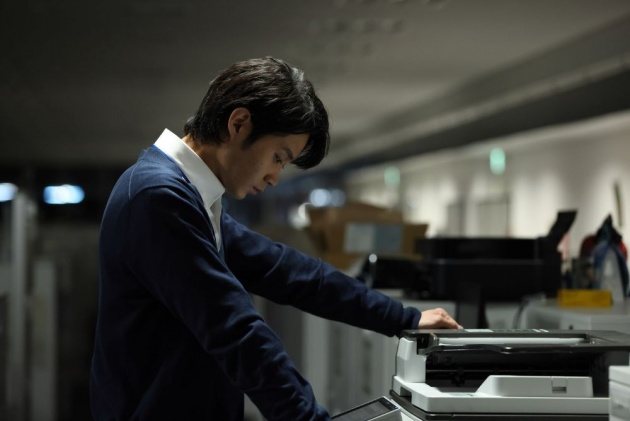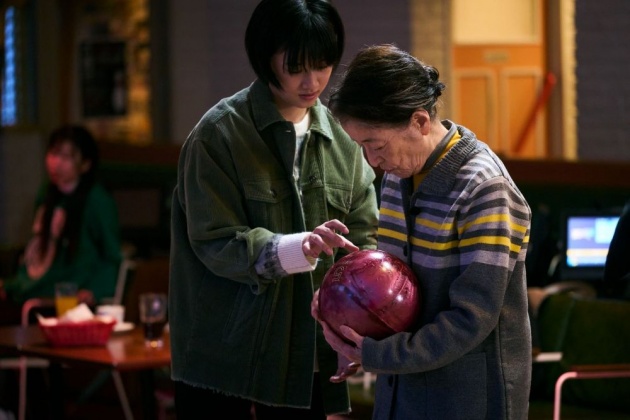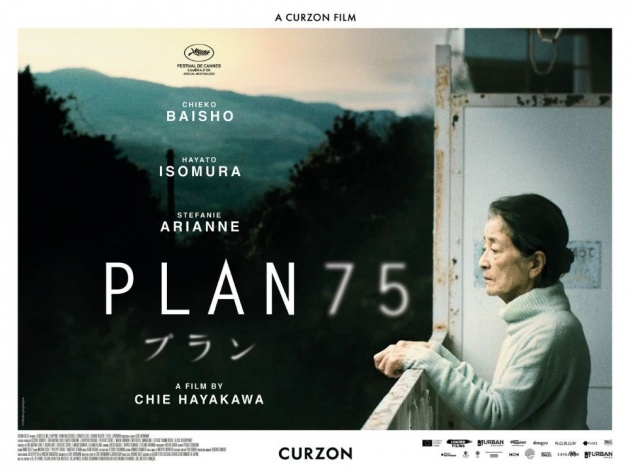
Pictured: Michi (Chieko Baishô) enquires about a government-sponsored euthanasia scheme in the Japanese drama, 'Plan 75', co-written (with Jason Gray) and directed by Chie Hayakawa. Still courtesy of Curzon Film (UK)
Contains spoilers.
In her debut feature, Plan 75, Japanese co-writer-director Chie Hayakawa imagines a government-sponsored programme of voluntary euthanasia for citizens aged seventy-five and over. This section of society is considered a burden on the young and, in Hayakawa’s film at least, the subject of hate crimes. In the film’s arresting opening, in which the drama is initially out of focus, a young man kills an older person before he washes his hands (in focus); we note the camera on his forehead, as if live streaming his actions. We then see him read out the remainder of his manifesto and before turning his shotgun on himself. Hayakawa then introduces seventy-eight-year-old cleaning woman, Michi Kakutani (Chieko Baishô) who works in a hotel. She continues to contribute to society though has no family – we learn that her baby died in childbirth, strangled by the umbilical cord. Michi expresses an interest in the programme for reasons that are not exactly clear; it is as if Hayakawa didn’t want to show a direct causal link between the circumstances that would require Chieko to end her life and the decision itself. Her hotel cleaner friends, with whom we see her dine – Michi cuts up an apple, placing cocktail sticks in each slice so that her friends can take a piece without touching the fruit – watch her complete the form. At her briefing she is told that she will receive a grant equivalent to $1,000 (the yen amount isn’t subtitled) that she can spend on travel or a meal. Some participants in the programme spend it on their funeral, although there is no need since the programme will take care of her body. Later, we are told there is a ‘Plan 75 plus’, where you can pay to be pampered before your life is terminated – spa before you depart.
Working from a script co-written by Jason Gray, in turn the subject of an earlier short, contained in the anthology film, Ten Years Japan, Hayakawa asks a slightly different question. Not ‘what should be done about the elderly?’ Rather ‘what is it that makes a life meaningful?’ Do our lives cease to be valuable when we lose our connection to others and when we can no longer contribute? What is it to live rather than to exist? There is the counter-question, supported by the programme. Afflicted by the decay of the body, why should one being required to live as long as possible, albeit in pain and infirmity?
Plan 75 follows a group of characters who engage with, then rebel against, the programme. This consist of a young recruiter, Hiromu (Hayato Isomura) who finds himself unexpectedly reunited with his uncle, Yukio (Taka Takao), who has signed up for Plan 75, as well as a Filipino migrant worker, Maria (Stefanie Arianne) who joins the company to earn more than $1,500 so she can pay for her young daughter’s heart operation.
Films about impending death are by their nature meditative. Throughout, we ask, ‘should Michi die?’ ‘Does anyone have the right to insist on early termination of life?’ Hayakawa doesn’t show the elderly being a burden on society though early on we see Hiromu deal with an unresponsive elderly man who doesn’t register his number being called and whom he helps into a wheelchair. The man’s health has declined. By contrast, Michi is vital. Her life changes when a colleague at the hotel collapses in the shower while at work. All of the elderly staff are laid off on the presumption that employing them in their advanced age is an act of cruelty. The camera lingers on Michi as she empties her locker. In another scene, Michi returns to find all of the post boxes in her apartment building having been interfered with and a notice of impending demolition fixed to the wall. She needs to find a place to live. Visiting a letting agency – the fifth one she has tried - she is told that she can only move in if she can pay her rent two years in advance. Michi is unemployed so this is not possible. She visits an employment agency and types in her details as well as her age. ‘It’s not working,’ she tells an employee. ‘Yes, it is,’ a young female employee insists. It is just that looking at a job while at her age shows no results. Eventually we see Michi, with her back to us, wear a jacket with red lights on it conducting traffic around some roadworks. Hayakawa focuses on the flashing lights on her back that symbolise danger, removing any sense that Michi is a valuable human being. As the traffic eases, we see Michi step back and rest. Being on her feet aged 78 isn’t easy.

Pictured: Two things are inevitable - death and paperwork. Hiromu (Hayato Isomura) gets his copying done in a scene from the voluntary-euthanasia-themed Japanese film, 'Plan 75', co-written and directed by Chie Hayakawa. Still courtesy of Curzon Film (UK)
Hearing one of her friends discuss refusing to look after her daughter’s child, Michi phones her to ask if she may do so. We only hear Michi’s side of the conversation, but the answer is negative. ‘Does your daughter have any friends?’ she asks. Maria’s humiliation and neediness is of a different order. She is at an event when a Japanese woman tells her peer group about Maria’s daughter. ‘Isn’t she beautiful?’ she asks, sharing a photograph. Explaining the need for an operation, the woman produces a tin and asks for donations. ‘I told you they would help,’ she remarks to Maria. We sense though that Maria would need many more fund-raising events before she can afford the medical treatment. Afterwards, Maria is asked by a woman how much she earns. ‘I know of a job where you can earn more. It’s in the health sector.’ We guess where Maria will end up.
Michi and Hiromu meet one evening when Michi stands on the edge of an open-air Plan 75 recruitment event – curiously the scheme is spelled out in English, not Japanese. Sitting on a bench on her own, Michi is surprised when Hiromu brings her a bowl of soup together with a set of chopsticks, but no spoon, since Michi is expected to drink directly from the bowl. My sense is that in the drama’s actual chronology – and not the way the film is edited – Michi signs up for Plan 75 as a result of this encounter. We first hear of the scheme described through a radio broadcast; well, we wouldn’t want to see people being visually objectified. That said, at one point in a waiting room, a man angrily switches off the television showing a promotional video for Plan 75.
Early on, there is a scene in which Hiromu lies on an outdoor bench – the one that Michi later sits on – and is shown a number of bench dividers, each one intended to dissuade a vagrant from sleeping on the bench; the discomfort of trying to do so would be too great. Hiromu does not choose a hollow divider that he can slip his body through, or a hard one, but a solid one that is only moderately uncomfortable. We aren’t sure exactly what to make of the scene. Is the bench divider Hiromu’s idea or is it a demand of his employer?
Hiromu describes to a client how the dead are buried together. He later makes an unpleasant discovery - incinerated human remains being turned into landfill. Before then, he is surprised to meet his uncle at work. He is told that under company policy he cannot handle his uncle’s case – they have three degrees of separation. Nevertheless, he visits his estranged Uncle Yukio. The old man didn’t turn up for his brother’s funeral. He lives alone. We understand why he signed up for the scheme. Hiromu bonds with him, almost in spite of himself.
Towards the end, Hiromu is setting up the outdoor recruitment event when several projectiles filled with tomato juice or fake blood splatter against the Plan 75 sign. We then hear a car zoom away. There is clearly a protest movement against the Plan, even as we hear a radio announcement that the government is considering lowering the age limit of the scheme to sixty-five.
Michi bonds with her Plan 75 advisor over the phone. They meet at a café where Michi enjoys a lime green smoothie type drink topped with cream. By this time, she has had her final blow out meal – ‘deluxe sushi is quite something’. Michi does not have much use for her $1,000 grant so gives it to the young woman, with whom she also goes bowling. Michi’s first strike (taking place off camera) is unsuccessful. Michi is advised to take three steps and throw the ball. She achieves a complete skittle strike-out. High fives all round. What is clear from this scene is that elderly folk are perfectly capable of making new friends even at an advanced age. They can have fun and don’t need to be invisible.

Pictured: 'Take three steps forward and throw.' 78-year-old Michi (Chieko Baishô) gets her first bowling lesson in a scene from the voluntary-euthanasia themed Japanese film, 'Plan 75', co-written and directed by Chie Hayakawa. Still courtesy of Curzon Film (UK)
‘When you leave your home for the final time, leave your door open,’ Michi is told. ‘We made arrangements with your landlord to dispose of your belongings.’ We see Michi hang up a tea towel and smooth it out. Even though we know it will be disposed of after her death, Michi is still concerned about appearances. She wants her house to be pleasant for visitors even though she won’t be there herself.
Driving Uncle Yukio to his final appointment, Hiromu stops for a meal and offers him sake. We then see Yukio standing by the side of the road, retching, body bent at a 40-degree angle. Whether he is upset because of the alcohol or whether he dreads his impending check out, we don’t know. Michi is taken into the facility and laid out on a gurney. She peeps through a divider and sees Yukio’s closed eyes. This Plan is not for her.
As for Hiromu, he is helped by Maria and fastens the corpse of his uncle into the front seat of his car and drives off. He wants to give his uncle a dignified burial. On the road, he calls a funeral director. ‘Where is the body?’ ‘With me.’ ‘Is it in a coffin?’ ‘No.’ ‘Sorry, we don’t have any appointments until Friday, three days from now.’ ‘Oh.’ ‘Actually, there is an appointment here today, if you can get here by four.’ Hiromu puts his foot on the accelerator only to be stopped by the police. ‘Who’s that next to you?’ an officer asks. ‘My uncle.’ ‘Wait here,’ the officer tells him, taking away his licence for a check. It is safe to assume that he doesn’t make his 4:00pm appointment.
As for Michi, we see her standing on the edge of the road, looking out into the distance. Her future – no income, no home, likely to be prosecuted for breaking her voluntary agreement – is uncertain. But her dignity is intact.
Plan 75 does exactly what a film about voluntary euthanasia should do – make the viewer think about the issue. The drama is almost secondary. The film is less about this group of characters than the concept in general; the dehumanising nature of dealing with life without longing. When we think about life being valued, we think about the potential of the young – there is one shot of young girl skipping vigorously – and of desire. But life is also defined by what you do for others. ‘This nation has known sacrifice,’ we are told, the Plan being framed as somewhat patriotic. But is it right for the young to claim that elderly folk are a burden if young people slack, take drugs and engage in empty hedonism? Hayakawa doesn’t ask this question. The viewer might.
Reviewed at Curzon Canterbury Riverside, ‘Friar Screen’, Southern England, Sunday 7 May 2023, 11:00am Curzon Members screening (with coffee and cake)
'Plan 75' is available to watch on Curzon Home Cinema in the United Kingdom from Friday 12 May 2023




